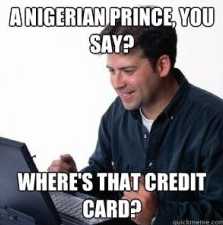Do you get calls from vendors nearly every day trying to pitch you on their products or services? Well, I do too and is a real time-waster.
Hiring a receptionist or virtual assistant to screen my calls would be nice but is not really practical for the side-hustle or lifestyle business owner, sometimes also called micro businesses.
Wouldn’t it be great if we had another way to screen these calls so that only the truly good ones landed on your desk?
Well, good news, there is a simple process derived from “game theory” that you can employ to make the caller actually self-filter themselves in a process I call self-weeding your economic garden.
Most of us are aware of the Nigerian scam, where you receive an email from a person claiming to be an African prince looking for an honest American to help him move large sums of money from his country to American banks in exchange for a healthy reward.
One only needs to enter the phrase “Nigerian Prince” into Google to see the word “Scam” show up in nearly every hit. With all the exposure of the Nigerian scam, why don’t the scammers at least try to mix up the story a bit? Change the country, or claim to be a businessman vs. a prince to avoid being exposed so easily as a scam?
The answer lies in a principle of game theory known as self-weeding. For the scam to work the scammer requires a very gullible person.
By changing up the scam even a little bit to make it appear a little more legitimate, the scammer will, in fact, get more inquiries. These inquiries take up more of their time by producing false positive responses that never produce the desired results.
If a person lives under a rock and is not aware of the Nigerian scam they are far more likely to be the extremely gullible candidate the scammer is looking for, and as a result, they will not take up much of his time to turn the deal. Essentially, by leaving the scam parameters alone the scammer weeds out all the people who might uncover the scam, leaving only the most desirable, most gullible marks.
The principle of self-weeding can be used effectively in legitimate business transactions. For example, I routinely employ a self-weeding technique in my investment business.
Several times a week I receive a call about an investment such as a new Oil and Gas, etc. Since some of the offerings only make sense for the most gullible of investors, I tell the callers that I have a process for evaluating deals and have an evaluation form on the web that I would like them to complete.
Since this action requires some effort on the part of the company soliciting me and implies that I have a process and therefore some knowledge in evaluating this type of deal, only companies that have an offering that they feel will stand up to an analysis agree to complete the form.
Therefore, through their own decision to either invest more time to complete the form or leave the sales process without completing the form, they essentially self-weed my prospective investment garden.
How can you use the concept of self-weeding in your business?









